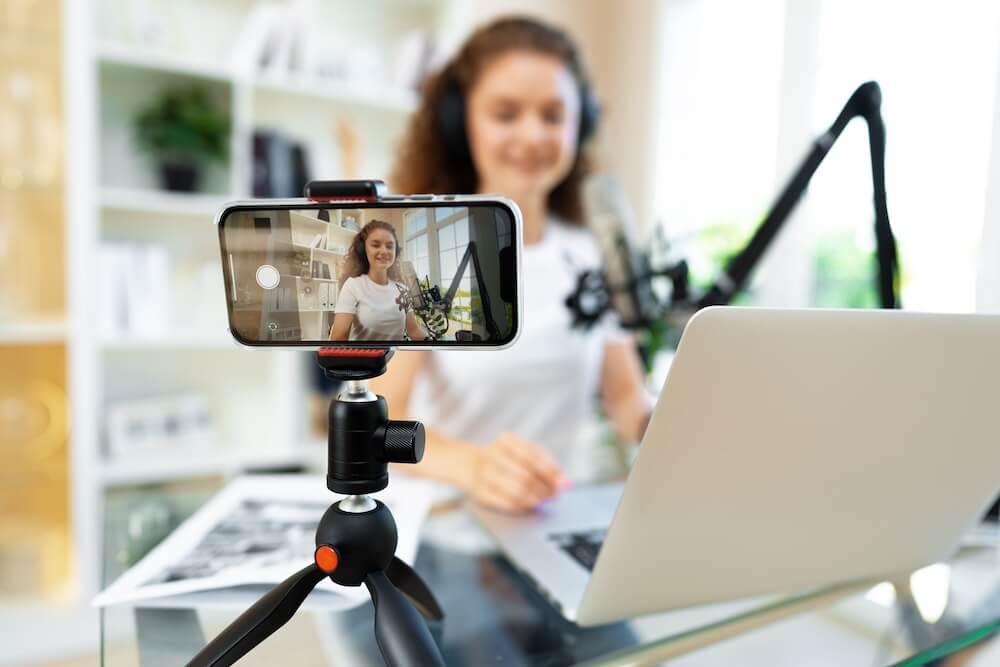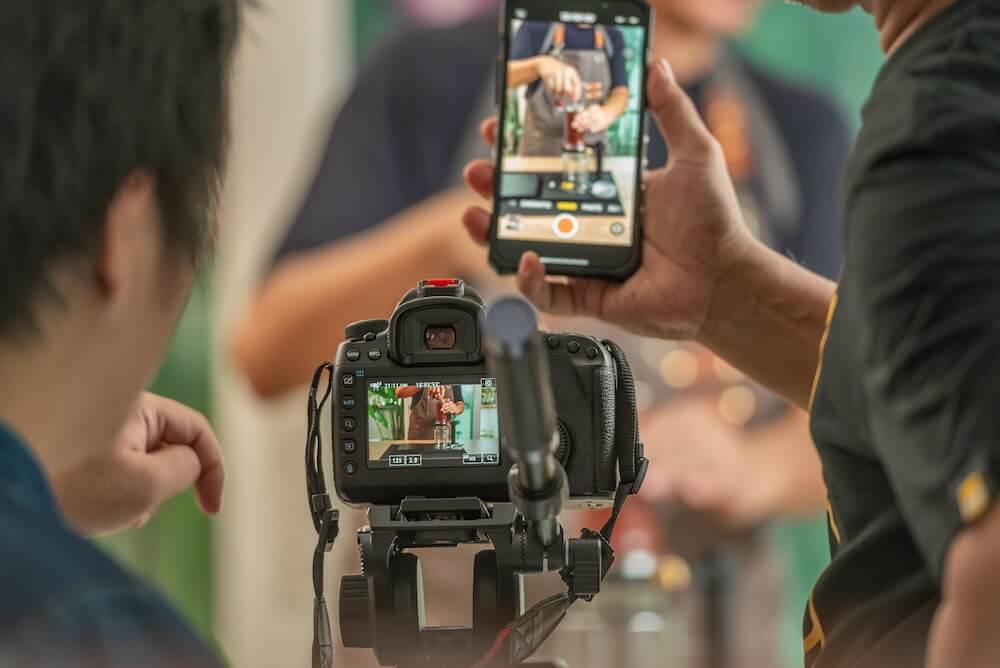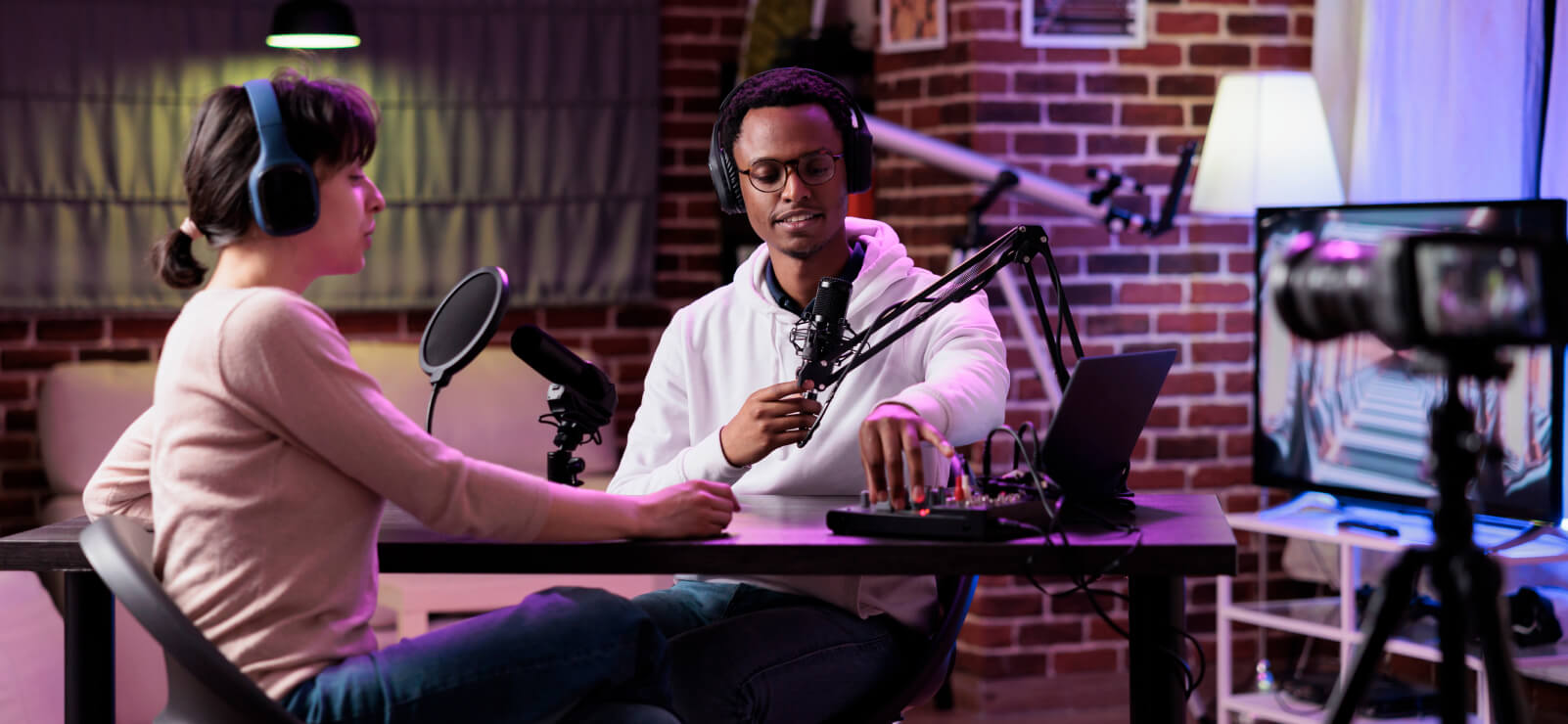Whether you’re showcasing cutting-edge research, talking with industry leaders, or telling the inspiring stories of your students, a well-executed podcast can significantly elevate your university’s brand authority and foster deeper engagement with your community.
But what, exactly, does it take for a university to get a podcast off the ground?
This article won’t cover the generic technical details of podcast production, like which microphones to use or how to upload your episodes to podcast hosting platforms; there are plenty of resources out there dedicated to that. Instead, we’re going to draw on our experience at TELL ME MORE® conceiving, launching, and managing podcasts for clients and use this article to talk about the special considerations and strategic planning required for universities to create a successful podcast.
From deciding on the right concept and selecting the right team to promoting your content effectively, we’ll guide you through the essential steps to ensure your university’s podcast stands out and engages your target audience.
Start with a Strong Concept: The Foundation of Every Great Podcast
Over the course of the last ten years or so, podcasting has exploded in popularity. A recent survey by Edison Research found that, as of 2023, 42% of Americans over the age of twelve had listened to a podcast in the last month—and 31% had listened to one in the past week.
With this many regular podcast listeners, there’s an excellent opportunity to reach a huge audience. The challenge is that there aren’t just a lot of listeners out there; there are also a lot of podcasts as well. The medium is currently supersaturated: meaning your podcast needs to offer something special in order to stand out from the crowd.
Why a Unique Concept Is Key to Your Podcast’s Success
A celebrity with a giant fan following might well be able to launch a successful podcast purely based on the power of name recognition. The same is probably not true for your university. But you certainly don’t need celebrity status in order to attract listeners; the key is a great concept that will differentiate your podcast from others and give people a reason to tune in.
So, how do you develop a solid concept?
Start by pinpointing the intent of your podcast. Are you aiming to educate and inform your audience? Or is the goal to attract prospective students by showcasing the vibrant campus life and unique achievements within your university?
Establishing an explicit intent for your podcast right from the outset is important, because it helps to clarify your goals and focus future decisions.
Choose the Right Format to Engage Your Audience
Once you’ve settled the intent of your podcast, you can move on to consider the format—that is, how each episode’s delivery and content will be structured.
What do you envision? A single host interviewing guests? Multiple hosts engaging in round table discussions? The answers you come up with here will impact certain logistical details, like how much space you need to record and what kind of budget you need to allocate for production.
Perhaps more importantly, though, this will help ensure that you’re offering your audience a consistent experience, which is essential to building familiarity and trust as you establish your podcast’s brand.

When if comes to format, there are a handful of options you might consider, such as:
- Interview: In this style of podcast, one or more hosts spend each episode interviewing guests on some topic; the type of guests invited and topics discussed really depend on the target audience and the intent of your program. The success of an interview-style format is also highly dependent on the personality of the host(s), with those capable of attracting good guests and leading authentic, engaging conversations getting the best results.
- Documentary: Documentary-style podcasts might resemble BBC or NPR programming, taking a more narrative approach to telling student, faculty, or alumni stories. This type of podcast might result in fewer episodes per season—it can take longer to do the research and capture the content necessary to produce the show—but it can also offer the opportunity to tell more meaningful stories, and to do so with a higher production value. Such podcasts also may be led by a narrator, rather than a traditional host.
- Themed Series: In a themed series, each season of the show will focus on a specific theme—such as innovation, leadership, or community impact, for example—with each episode exploring various aspects of that theme. This common thematic link holding the season together might allow for more flexibility between the format and presentation of individual episodes.
- Lecture Series: A lecture series podcast might consist of live or pre-recorded lectures by faculty members or other speakers not affiliated with the university, potentially followed by a roundtable discussion including the lecturer, hosts, and other guests. Lectures may be linked, as with a themed series, or they might be on diverse topics—with the format of the podcast representing the conceptual link between episodes.
This is far from a comprehensive list; we simply give these formats as food for thought as you begin developing your own podcast concept.
One good way to zero in on your concept quickly is to try to get a pulse on what your audience wants. Current students can provide a good benchmark for the type of content that might attract your target listeners; conduct surveys or informal polls to get insight into the topics and formats that resonate most.
Quality matters, but what really sets a podcast apart is being relatable. A focused and authentic idea that taps into your audience’s experiences will always resonate more. The key is to build a concept that not only aligns with your mission but also speaks to the heart of what your listeners care about.
Practical Considerations for Podcast Success: Format, Calendar, and Branding
With your podcast’s concept set, you’re ready to start making some tangible decisions about how to produce the show.
As we mentioned, although we’re not using this article to address the nitty-gritty technical logistics of launching a podcast, there are a few practical considerations you’ll need to keep in mind in order to move forward.
Which Media Format Will You Use?
One of the first decisions to make is which media format you plan to use for recording and releasing your content. Will your podcast be audio-only, or will you also incorporate video?
A YouGov survey found that audio is the preferred medium among podcast listeners, and audio-only shows are easier (and less expensive) to produce. However, many podcasters also capture their episodes on video, uploading the content to platforms like YouTube in order to expand their reach.
Video content is also great because it can be turned into excellent marketing collateral—but more on that later.
As you consider which media format(s) to use, also think about the production value you want to achieve. Do you plan on producing a highly polished, professional podcast, or something more casual and authentic? This decision, coupled with your choice of format, will have a bearing on the kind of equipment you’ll need, the size of your recording space, and the expertise required from your production team.

What’s Your Content Calendar Going to Look Like?
Next, think about your publishing schedule. How often are you going to release your episodes? Decide whether a monthly, biweekly, or weekly schedule fits best with your show’s intention and concept (and, of course, the resources available to you).
Also, you’re going to need to decide how long your episodes are going to be. Quick 15-20 minute episodes a listener can fit into their busy schedule? Longer 40-60 minute episodes that might allow hosts to tackle topics in greater depth? Again, this decision likely depends on your goals for the show.
The main consideration here should be consistency. Consistency is key to building and retaining an audience, so make sure you settle on a schedule you’re going to be able to stick with. Aside from that, a consistent schedule will help with resource planning and creating a content schedule to guide your programming.
How About the Show’s Branding and Identity?
A strong brand identity will also help your podcast stand out from the competition. Work with a designer to create a logo and other visual elements that align with your institution’s ethos and identity. These assets can be used on your podcast’s website, social media channels, and promotional materials—which we’ll discuss a little later on in this article.
The final piece of your podcast’s identity is a great name—something that’s specific, memorable, and captures the spirit of your university. You’re going to be stuck with this name, so spend the time necessary to workshop a good one!
Assemble the Right Team to Bring Your Podcast to Life
Once you’ve ironed out these fundamental details for your podcast, it’s time to assemble the team that will bring your plan to life. Producing a great podcast takes commitment to a shared vision, so you want to make sure you’re surrounded by the right team to help you achieve your goals.
Choosing a Host
A compelling host is the driving force behind any successful podcast. More than just a voice behind the microphone, they set the tone, foster connections and keep listeners engaged. So choose wisely.
Look for someone who’s comfortable in the spotlight, has a natural ability to build relationships, and, perhaps most importantly, who has a voice that’s pleasant to listen to!
That much would be true for any podcast, but for universities there are some other considerations. Whether it’s a well-respected faculty member, an alumnus, or a member of the administration, a host with a direct tie to the university adds credibility and helps the podcast stay true to the school’s values.
That last part is key. You want someone who understands and is invested in the school’s mission, and who will ensure that the podcast consistently reflects the university’s image.
Moreover, in this day and age, it’s important that hosts have a strong social media presence and are capable of using that presence to gain visibility for the podcast. While it isn’t a deal breaker if a host isn’t an influencer from the start, it’s important to choose someone who can build an online following over time.
Social media is such a huge component of podcasting. If you don’t have a strong social media presence to promote your show, it’s going to go dormant—there’s not going to be any movement with listenership. Look at your host as a sort of influencer.
Gathering the Rest of Your Team
While the host is the voice and face of your podcast, it’s the team behind the scenes that ensures everything runs smoothly.
As you begin to gather your production team, first on your list should be a producer. This person should be a strategy-minded marketer capable of everything from landing guests and coordinating logistics to drafting interview outlines and doing research. This role is essential, because this person is responsible for crafting the storyline for the podcast, keeping listeners hooked from one episode to the next.
You’ll also want to find a great editor, capable of transforming your raw recordings into polished episodes and publishing them to the various platforms you use. Alongside this, a skilled graphic designer can create the visual assets that accompany your podcast—like episode thumbnails, social media graphics, and promotional materials—which help in establishing a strong identity and attracting new listeners.
Additionally, securing buy-in from senior leadership at your institution is crucial to ensure your podcast aligns with the university’s strategic goals and has the necessary resources to sustain production. Collaboration with the social media team is also key to integrating podcast promotion into broader marketing strategies. And don’t forget to work closely with compliance to ensure all content follows university guidelines.
If you’d rather work with an already established team, at TELL ME MORE®, we specialize in helping universities and organizations with the entire podcast production process, guiding clients from strategic concept to launch and beyond. Our team has extensive experience in podcast production services, from content strategy and recording to post-production and distribution – as well as working with university social media and legal compliance teams.
How to Attract and Book Great Guests for Your Podcast
After you’ve assembled your production team, you’re ready to start reaching out to guests.
How to Land Guests When You’re Just Getting Started
While you might have dreams of high-profile guests and star-studded episodes, it’s important to be realistic about the type of guests you’ll be able to attract in the early going.
Until you have established a solid track record, a lot of potential guests probably won’t even consider appearing on your show. Your best bet, then, is to start with low-hanging fruit—faculty, alumni, and other people with direct connections to the university.
We don’t suggest this just because these guests will be easier to book; guests with connections to the university are more likely to understand and support its mission, and so will almost be early collaborators in the success of the podcast.
Attracting More Prominent Guests
Once you get the ball rolling, you can start to set your sights higher and attempt to attract more prominent guests.
One great way to do this is to create a professional media deck for your podcast. This should include your school’s branding along with details about your podcast, including notable guests, audience demographics, and highlights of past episodes. A well-designed media deck makes a strong first impression and can increase the likelihood that a potential guest will consider your invitation when they open up your pitch email.
Booking great guests can really raise the profile of your podcast, and having a solid deck is the best way to appeal to them—which is why we recommend this to all of our clients.
With our influencer marketing expertise, we’ve helped clients secure thought leaders, distinguished alumni, and influential public figures for their shows. By employing targeted outreach strategies and leveraging our industry connections, our team at TELL ME MORE® can help maximize your chances of landing the guests that elevate your podcast’s visibility.
Writing the Perfect Pitch Email
If writing a pitch email to try to appeal to prospective guests seems daunting, here’s our simple formula for writing the perfect email.
- Use the first sentence or two to say something specific and complimentary about the potential guest—this is not only flattering, it shows you’ve done your research.
- Then, introduce yourself, the podcast, and make your invitation.
- Next, explain why you think the guest would be a good fit.
- Provide a link to your media deck, and invite them to follow up after they’ve had a chance to review it.
- That’s it! Short, sweet, and to the point, starting with flattery and ending with a tantalizing presentation—who wouldn’t want to say yes?
Another reliable way to attract guests is to look for people who have something of their own to promote, like a business, product, or book. They’re looking for exposure, and you can give them a platform. It’s a win-win, and a great way to land high-quality guests for your show.
Finally, here’s a tip to keep in mind as you start booking guests and getting ready to release your first episodes: don’t release them one by one. Instead, aim to record several—maybe as many as five—before your official launch. Having multiple episodes ready to go gives your podcast a more established feel and encourages new listeners to engage more deeply with your content from the very first time they encounter it.
Develop a Winning Promotion Strategy to Grow Your Podcast Audience
Even the best podcast will struggle to gain traction without a robust promotion strategy; high quality content is a must, but effective promotion ensures that it reaches and resonates with your target audience.
There are a few avenues you can turn to as you develop your own promotional strategy.
Optimizing Your Podcast’s Web Presence
Another excellent—and often overlooked—promotional strategy is to build dedicated web pages for each podcast episode. These pages should include episode summaries, transcripts, guest bios, and relevant links.
This is where search engine optimization (SEO) comes into play: by optimizing each page for search engines, you increase the chances of your podcast being discovered by new listeners who may not have initially set out to find it. When potential listeners search for topics that align with your episode content, these pages can act as a gateway to your podcast.
Working with a dedicated full-service marketing team that knows how to build pages that are fast, well-designed, and optimized for SEO is key. A strong web presence ensures your podcast is not only easy to find but also engaging to explore, helping to increase visibility and attract new listeners.
SEO Best Practices for Your Podcast
- Keyword Research: Identify the specific keywords and phrases relevant to each episode topic and integrate them into the title, headers, meta descriptions, and throughout the body text.
- Transcriptions: Adding full episode transcriptions not only enhances accessibility but also improves SEO by offering search engines more content to index.
- Internal Linking: Link to other relevant episodes or university content to keep users on your site longer, which signals to search engines that your content is valuable.
- Backlink Strategy: Encourage guests to share the episode and link back to it on their own websites or social media, helping to build backlinks that improve the pages’ search ranking.
Leveraging Video Collateral to Maximize Your Podcast’s Reach
One of the most impactful ways you can promote your podcast is through the use of video on social media platforms.
Why? Because on platforms like YouTube, TikTok, and Instagram, the algorithm favors video when choosing what new discoverable content to display to users. But beyond just social media engagement, it’s important to recognize that platforms like YouTube and TikTok have evolved into powerful search engines in their own right. When users search for topics related to your podcast’s content, optimized video clips can significantly increase your chances of being discovered.
By extracting 15- or 30-second video clips that highlight great moments or intriguing insights, you can get your content in front of a lot of people’s eyes—and potentially capture their attention.
There are even new AI-powered tools that can help with this, such as Opus Clip, which can pick out the clips from your videos that are most likely to go viral. It’s an excellent time saver that can help your production team create engaging, influential content faster.
Video is also a huge asset for other marketing efforts—for example, you might be able to repurpose clips from the podcast to highlight noteworthy faculty on your website, or to include student testimonials in newsletters to your mailing list. The versatility of these video clips is almost inexhaustible; we recommend universities capture their episodes in video in order to take advantage of this wonderful marketing resource.

Maximizing Cross-Promotion
Another top strategy for promoting your podcast is cross-promotion. There are a handful of ways to approach this, such as:
- Encouraging your host to be a guest on other podcasts, which can introduce your podcast to new audiences with similar interests. This kind of cross-promotion is common in the podcasting world and can significantly boost your listener base.
- Getting active on social media by collaborating with your university’s existing social media team to share content such as episode announcements, behind-the-scenes content, and viral snippets. Your host can also encourage your host to share content with their own social media network; beyond that, staying engaged with past guests can help you tap into their audiences, expanding your reach further still.
- Collaborating with different university departments. For example, your alumni office could promote episodes featuring notable alumni, or your admissions office could share content from an episode showcasing student life. This kind of internal collaboration can enhance the legitimacy of your podcast while expanding its reach.
A podcast can be so versatile—it’s not just about the show itself, but how it plugs into the broader marketing strategy of your school.
What Could a Great Podcast Do for Your University?
Developing a great podcast takes time; realistically, you should give yourself a good six months or so to consider your concept, decide on a format, gather the right team, and start producing and marketing the show.
But all that time and effort will pay dividends down the road, because a high-quality podcast is more than just content—it’s a strategic asset that can build community, enhance your university’s reputation and amplify your institution’s voice as part of a broader marketing strategy.
Creating a podcast that stands out requires more than just time and resources—it demands a team with expertise in SEO, content strategy, and production. At TELL ME MORE®, we understand the unique needs of higher education institutions and have a proven track record of crafting podcasts that amplify your institution’s voice, engage your audience, and deliver measurable results.
Talk to us today to discover how our dedicated team can help you create a podcast that engages, inspires, and supports your institution’s long-term goals.


